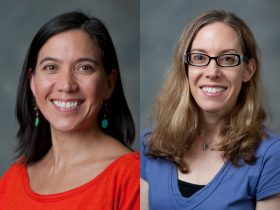Research by Elon University professors Aunchalee Palmquist and Kirsten Doehler suggests that most women in the United States who donate human breast milk to another mother do so with caution and knowledge about each other.

Based on the first national online survey of its kind, the researchers also found that contrary to public perception, women who receive donated milk often take steps to screen their providers, though mothers aren’t as particular when the donor is someone in the family or whom they already know.
“Human milk sharing practices in the U.S.” by Assistant Professor Aunchalee Palmquist and Associate Professor Kirsten Doehler appears in the upcoming edition of the journal “Maternal & Child Nutrition.” The 867 women – 661 donors, and 206 recipients – who completed the survey helped the Elon team create a clearer picture of a rapidly growing practice in the United States.
Among those in the study, only 4 percent reported seeking human milk for a critically ill infant. Most milk-sharing recipients have healthy babies but are mothers who have had breastfeeding difficulties.
The findings are something both researchers hope will be used by healthcare providers when educating new mothers about the benefits and risks associated with different types of infant feeding. Mothers are increasingly aware of milk sharing, the researchers said, but health care providers are not usually involved in milk sharing decisions.
“The way milk sharing has been portrayed in media – that it’s a dangerous, dirty thing – is not consistent with the evidence we have right now,” Palmquist said. “The milk being shared is the same milk donors are feeding their own babies.”
In the survey, Palmquist and Doehler found that most screenings are conducted face-to-face with questions about a donor’s health, alcohol use, drug use, and tobacco among top concerns. But face-to-face interactions were often between family members or friends. Surveys showed perceptions of risk were lower the more familiar donors and recipients were with each other.
Many who request or receive milk are mothers who either need supplements to improve the quality of their milk or lack a sufficient production of milk to adequately feed their child, the survey found. Only 10 percent of respondents used a nonprofit human milk bank, like those run by the Human Milk Banking Association of North America.
And those who are paid, or pay for, their donations are few in number, according to the survey. Just 2 percent of donors received money for sharing their milk, and just 9 percent of recipients told researchers they’ve ever paid for milk. In a previous study, Palmquist and Doehler found that most of the people practicing milk sharing were self-identified white, middle-income, college-educated women.
The Elon team described the study as a step toward improved health of the increasing number of parents who are trying to provide their children with human milk. “It’s important for healthcare providers to understand what families are doing and be able to provide them with information that can help them make practices safer,” Palmquist said.
Palmquist and Doehler found one statistic that caused some concern. Less than 10 percent of those involved in milk sharing “flash heat” the donated milk and, of those who did, just half had gathered information regarding serological tests as part of their donor screening. Flash heating minimizes the risk of HIV transmission.
Palmquist is a medical anthropologist and International Board Certified Lactation Consultant. Before arriving at Elon, she held a two-year appointment as a postdoctoral associate and lecturer at Yale University, Jackson Institute for Global Affairs, Global Health Initiative. Palmquist has conducted research on a wide range of topics, from healing systems in Palau to family communication about genetic test results in the United States. Her current research addresses social inequalities in health, infant and child health, women’s and gender studies, and science and technology studies.
Doehler’s academic interests include seminonparametric density estimation, nonparametric statistics, survival analysis, statistics education, and statistical consulting.
Palmquist is continuing her work with an ethnographic study of people who took part in the survey to learn more about individual stories of human milk sharing. Milk sharing is a completely different practice than how it has been portrayed in the media, she said. People who are milk sharing are not buying and selling milk anonymously.
“When you put a price tag on milk it introduces many opportunities for exploitation,” Palmquist said. “At least two studies have found that milk bought anonymously online had evidence of tampering with bovine milk and microbial contamination due to poor handling.”
Palmquist and colleagues at North Carolina State University have begun a study to assess whether these risks are also relevant to informed milk sharing. Previous studies of milk selling have not revealed much about the safety of milk sharing practices when people know each other and screen each other.
“This is not a bizarre, 21st century, newfangled practice,” Palmquist said. “Humans have always shared breast milk. The difference is with online communities. There’s potential now for you to share with a stranger, someone not in your immediate community. But what we see is that even when people meet online, milk sharing brings them closer together. Donors and recipients become friends.”
– Brittany Barker ’19 contributed to this story


